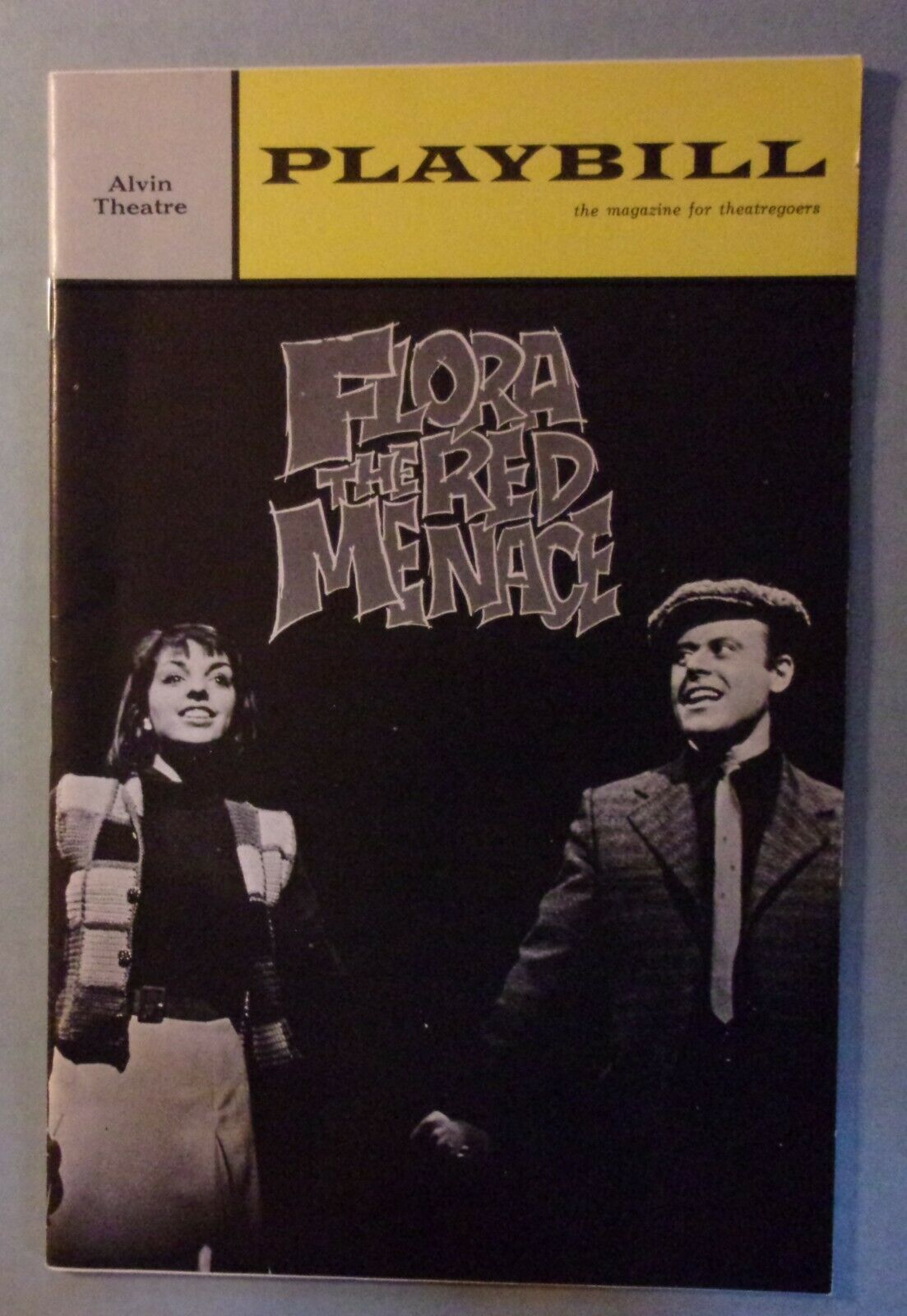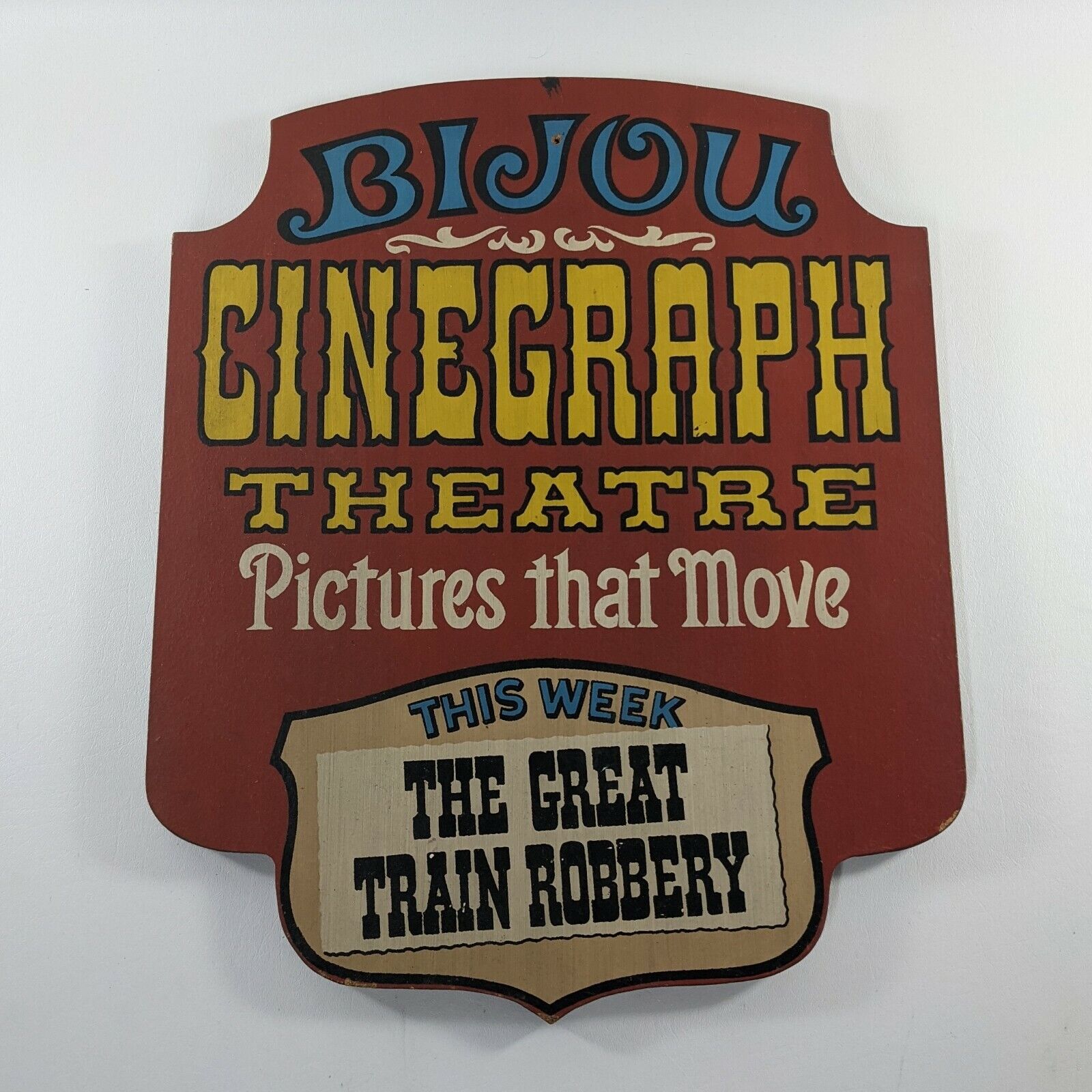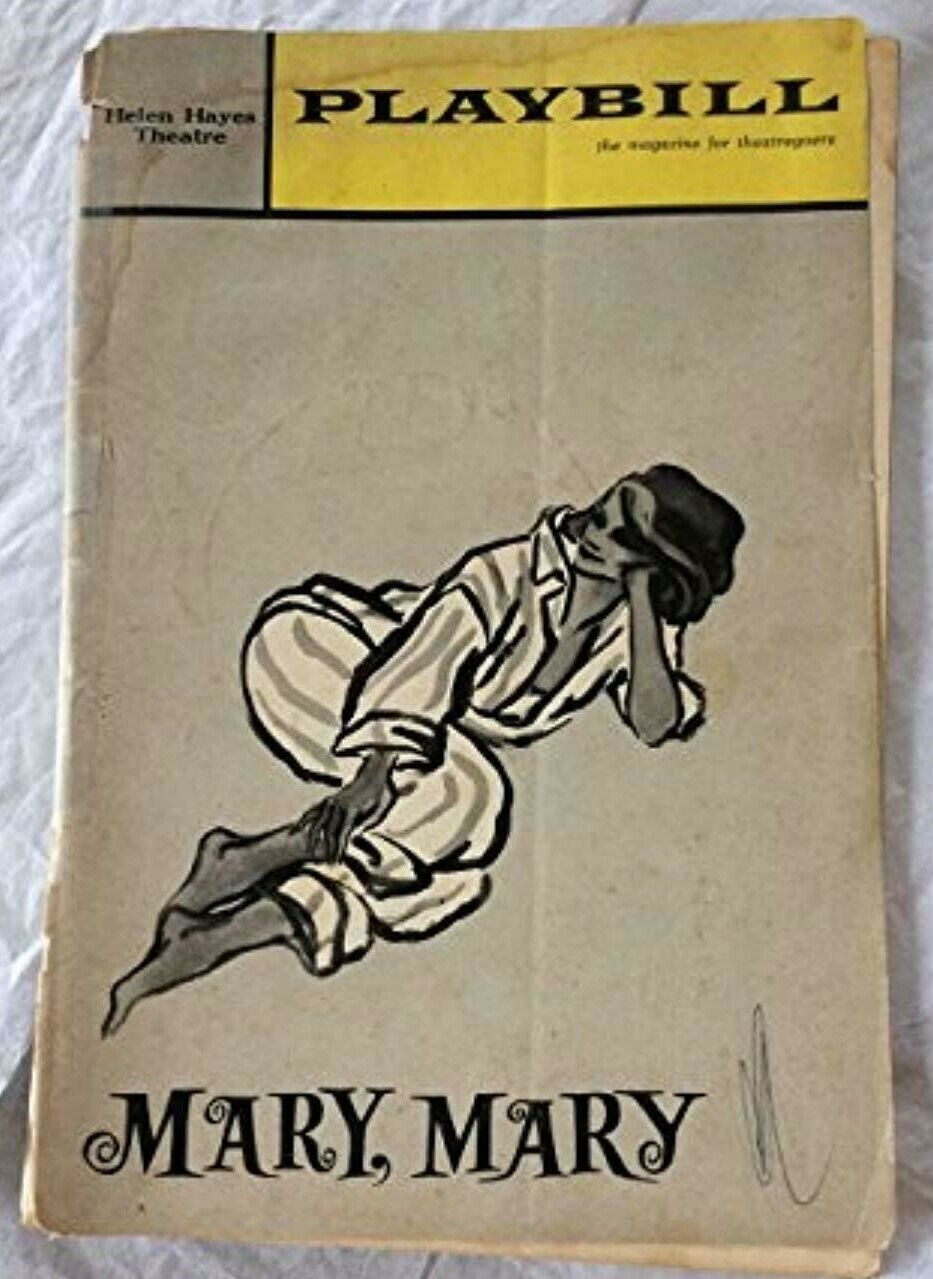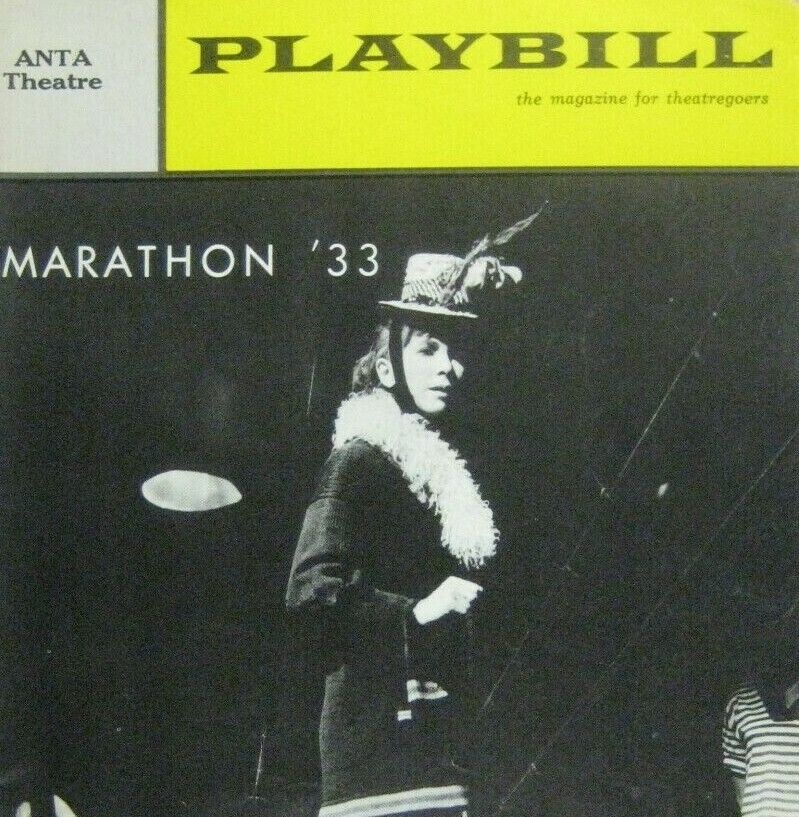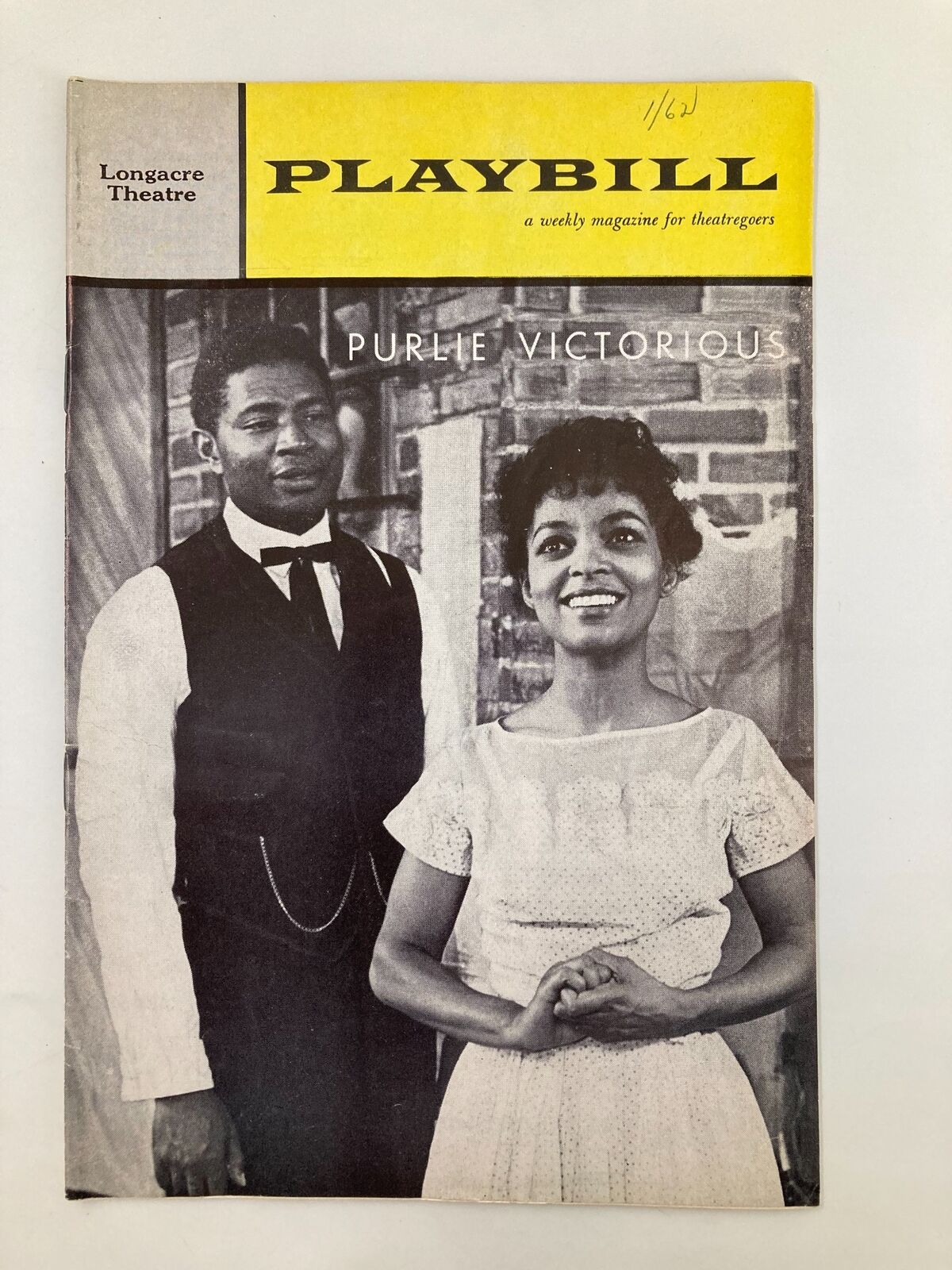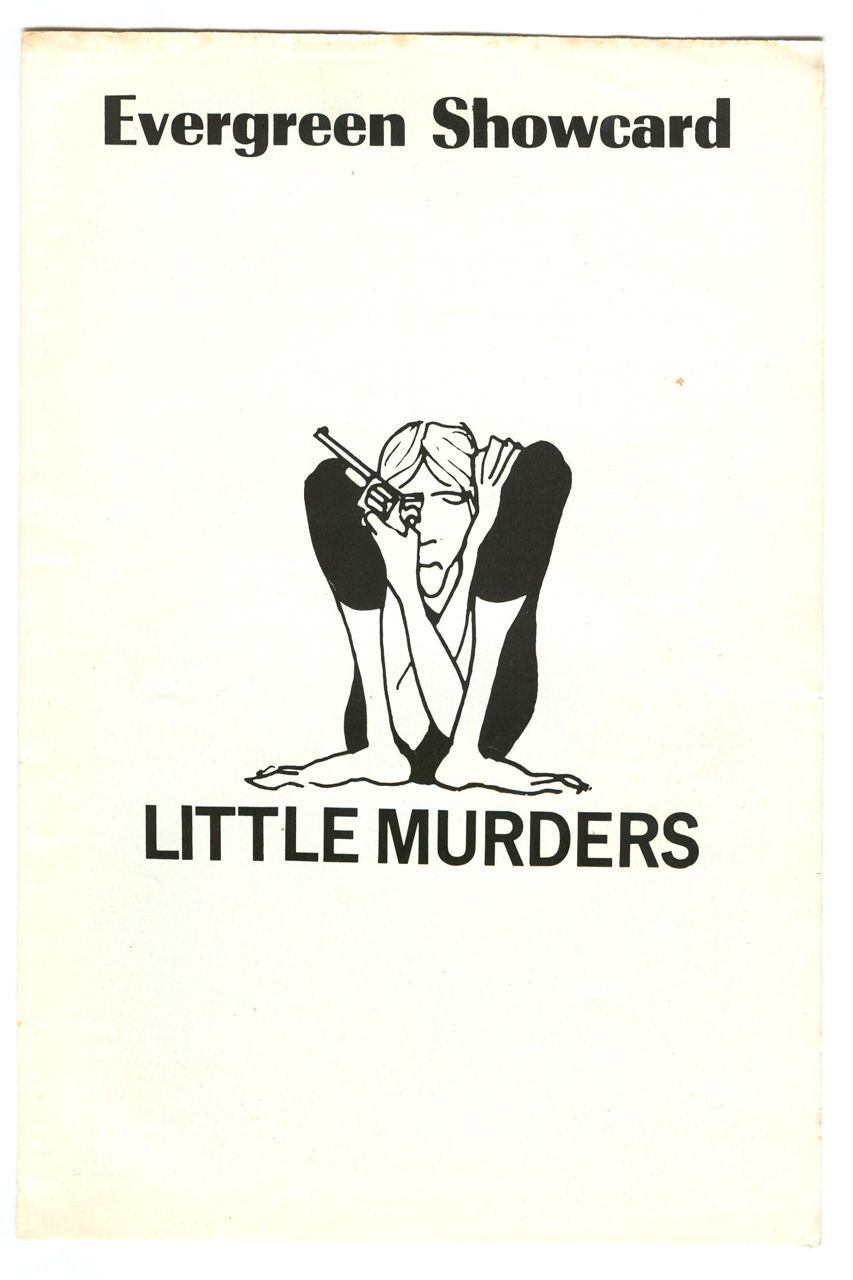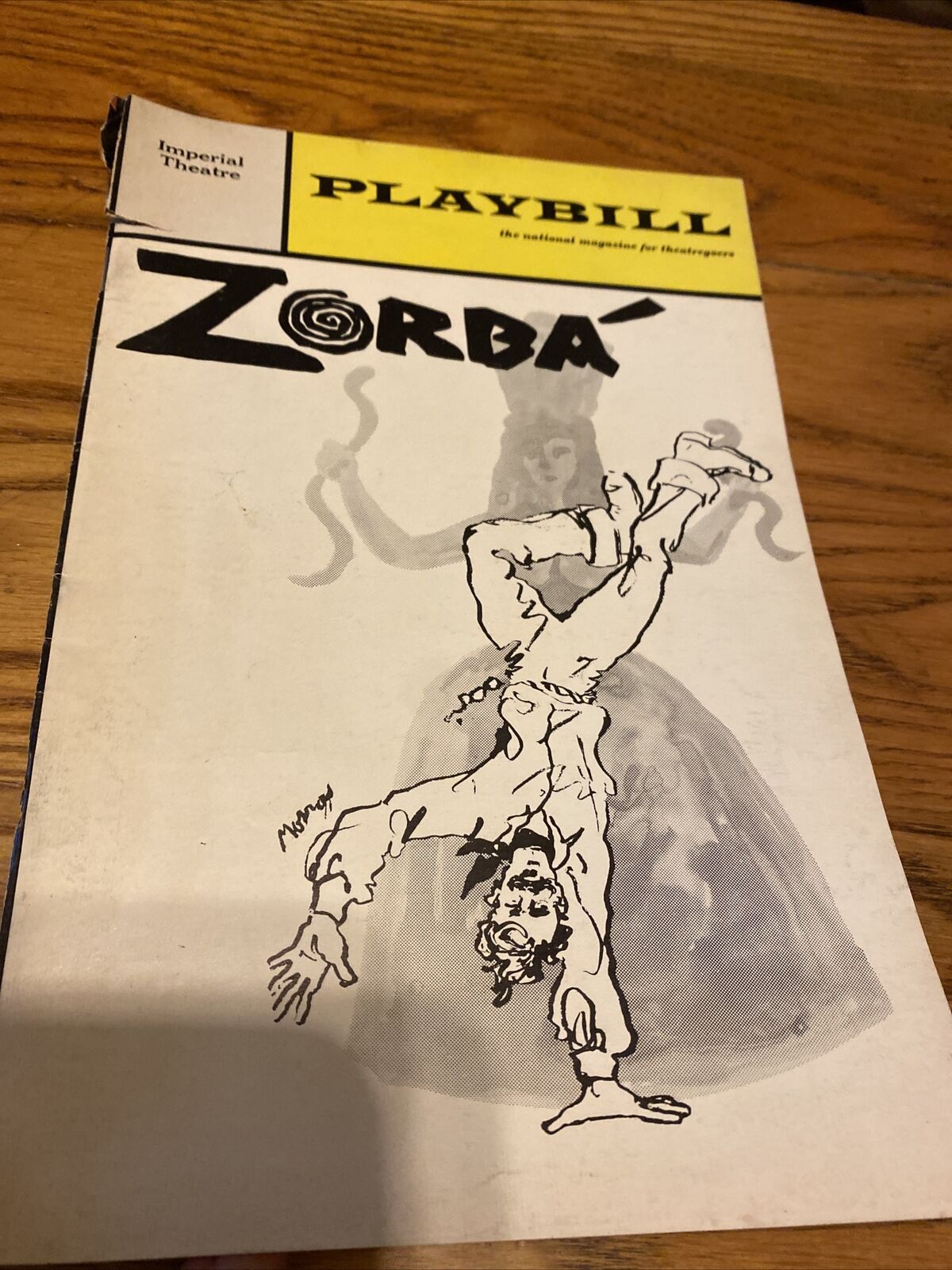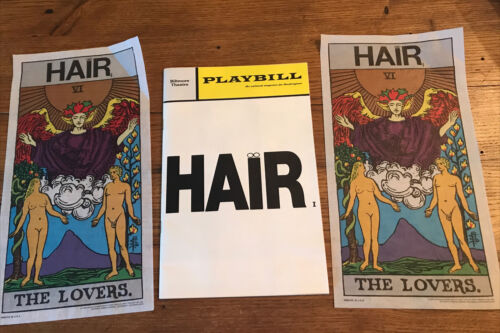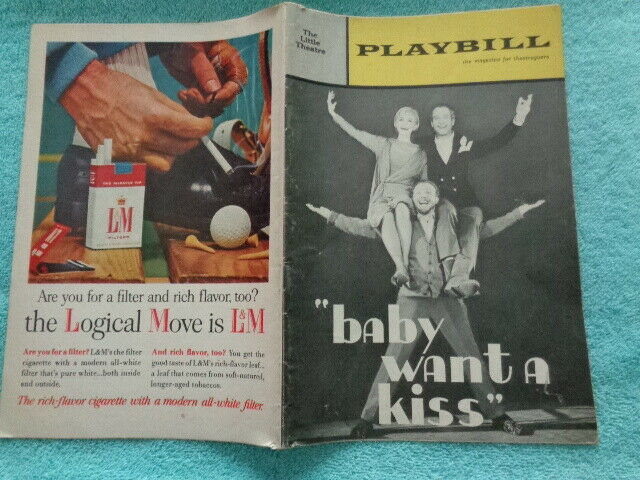-40%
1965 Playbill ; Liza Minnelli, Bob Dishy ; Flora The Red Menace ; Alvin Theatre
$ 6.33
- Description
- Size Guide
Description
June 1965 Playbill (opening night was May 11, 1965) ; Liza Minnelli, Bob Dishy, Mary Louise Wilson, Cathryn Damon, Robert Kaye et al ; Flora The Red Menace, a musical by John Kander, Fred Ebb, George Abbott & Robert Russell ; Alvin Theatre (New York, N.Y.); Program is in Excellent condition.
52 pages : illustrations ; 23 cm ;
New York, NY : Playbill Inc.,
Issued as Volume 2, no. 6 (June 1965) of Playbill.
Cast:
Liza Minnelli,
Bob Dishy,
Mary Louise Wilson, Cathryn Damon, Robert Kaye, James Cresson, Dortha Duckworth, Stephanie Hill, Joe E. Marks, Louis Guss, Gordon Dilworth, Marie Santell, Art Carney (voice of Franklin Delano Roosevelt),
J. Vernon Oaks. Clark Morgan, Daniel P. Hannafin, Henry LeClair, John Taliaferro, Anne C. Russell, Anthony Falco, Les Freed, Robert Fitch, Clark Morgan, Danny Carroll, Jamie Donnelly,
Elaine Cancilla, Ciya Challis, Barbara Doherty, Judith Doren, Ellen Graff, Mary Ann Niles, Phyllis Wallach, Harry Bell, Marcello Gamboa, Charles Kalan, James McArdle, Neil J. Schwartz ,
Barbara Christopher, Diane McAfee, Abbie Todd.
Harold Prince presents ... book by George Abbott and Robert Russell, music by John Kander, lyrics by Fred Ebb, dance and musical numbers staged by Lee Theodore (based on the novel "Love is Just Around the Corner" by Lester Atwell), settings by William and Jean Eckhart, costumes by Donald Brooks, lighting by Tharon Musser, musical direction by Harold Hastings, orchestrations by Don Walker, dance arrangements by David Baker, production directed by George Abbott, production supervisor: Ruth Mitchell.
Advertisements in the program include: Columbia Records
Original Cast Recording of Richard Rodgers' & Stephen Sondheim's Do I Hear a Waltz? ;
Capitol Records Original Cast Recording of Sammy Davis in Golden Boy ; RCA Victor
Original Cast Recording of Flora The Red Menace ;
John Gary in the Persian Room of The Plaza ; Jetarama Theater by United Airlines ; Vista-Cruiser by Oldsmobile ; Chrysler Imperial-Vintage 1965 ; Hawaii Kai Polynesian Restaurant.
Articles
in the program include: "unLikely Casting 16 by Hirschfeld: Walter Matthau and Nancy Walker as Romeo and Juliet" ; "Screen & Stage: Kith or Kin?" by Dore Schary (about the relationship between Broadway & Hollywood) ; "San Francisco's Theatre Crisis" by Theodore Hoffman (focuses on Herbert Blau, Jules Irving, Kenneth Kitch, Jeremy EtsHokin, and the Actors Workshop).
Song list:
Act I
Prologue – Ensemble
"Unafraid" – Flora, Students and Ensemble
"All I Need is One Good Break" – Flora, Harry Toukarian and Artists
"Not Every Day of the Week" – Flora and Harry Toukarian
"All I Need is One Good Break" (Reprise) – Flora, Elsa and The Lady
"Sign Here" – Harry Toukarian
"The Flame" – Comrade Ada, Harry Toukarian and Comrades
"Palomino Pal" – The Lady and Cowboy
"A Quiet Thing" – Flora
"Hello, Waves" – Harry Toukarian and Flora
"Dear Love" – Flora and Ensemble
Act II
"Express Yourself" – Comrade Charlotte and Harry Toukarian
"Knock, Knock" – Comrade Ada and Cowboy
"Comrade Charlotte's Ballet (The Tree of Life)" – Comrade Charlotte, Comrade Ada, Harry Toukarian and Ensemble
"Sing Happy" – Flora
"You Are You" – Mr. Weiss, Elsa, Flora, Mr. Stanley, Lulu, Katie and Joe
Finale – Entire Company
Liza Minnelli bio:
"Singer and actress Liza Minnelli was born on March 12, 1946, in Los Angeles, California. While her first appearances were with her superstar mother, Judy Garland, Minnelli has been able to step out of her mother’s shadow to establish a substantial career as a performer. In addition to Garland, Liza's father Vincente Minnelli was also well known in Hollywood for his work as a director. Minnelli made her film debut as a toddler in the musical comedy In the Good Old Summertime (1949), which starred her mother and Van Johnson. While she made other appearances in her mother’s concert productions, Minnelli's career in entertainment did not start in earnest until later ... Her parents divorced in 1951, and Minnelli divided her time between her parents. Her mother married producer Sid Luft in 1952, and Minnelli soon was a big sister to half-siblings Lorna (born in 1952) and Joey (born in 1955) ...
As a teenager, Minnelli gave up on school and went to New York City to pursue a stage career. She landed a role in the off-Broadway revival of the musical Best Foot Forward in 1963, which brought her strong reviews. Around this time, Minnelli also appeared on her mother's short-lived television series, The Judy Garland Show. Minnelli also performed with her mother during Garland’s stint at the Palladium in London and wowed audiences and her mother with her vocal prowess. According to The New York Times, Minnelli said "It was like Mama suddenly realized I was good." In her first leading Broadway role, Minnelli appeared as the title character in Flora, The Red Menace in 1965. The light musical comedy poked fun at the 1930s communist movement ... the musical brought Minnelli a Tony Award for Best Actress in a Musical. She was only 19 at the time, making her one of the youngest performers to ever win the award. Minnelli went on to co-star in the dramatic comedy Charlie Bubbles (1967) opposite Albert Finney. Playing an offbeat misfit named Pookie, she received her first Academy Award nomination for Best Actress for her work in the 1969 film The Sterile Cuckoo. During the production of her next film, Otto Preminger’s Tell Me That You Love Me, Junie Moon (1969), Minnelli suffered a great loss. Her mother died from an accidental drug overdose on June 22, 1969. Two years later, Minnelli landed her greatest film role, playing floundering nightclub singer Sally Bowles in the musical Cabaret (1972), which was set in Germany in the 1930s. The film, directed by Bob Fosse, showcased her singing talents as well as her range as an actress. For her efforts, Minnelli won the Academy Award for Best Actress ... Minnelli’s hot streak continued with the television special, Liza with a Z, which was produced by Fred Ebb and Fosse. The show won the Emmy Award for Outstanding Single Program—Variety and Popular Music in 1973 ...The musical New York, New York (1977) gave her a chance to work with famed director Martin Scorsese and actor Robert De Niro ... returned to Broadway in The Act in 1977. She played a washed-up singer trying to revive her musical career. Giving an outstanding performance, Minnelli netted her second Tony Award for Best Actress in a musical. A few years later, she had another success on the big screen with the romantic comedy Arthur (1981). Minnelli co-starred with Dudley Moore as a waitress who falls in love with a wealthy, but often inebriated man ... Her acting career perked up in recent years, with her humorous guest appearances on the series Arrested Development in 2004 and 2005 and her role in Sex and the City 2 (2010). For the most part, however, Minnelli has focused on live performances. She gives numerous concerts each year around the world ... "
John Kander bio:
"
American composer John Kander (b. Kansas City, MO, March 18, 1927) is the musical partner of the songwriting team of Kander and Ebb, who together created at least sixteen Broadway shows, Flora the Red Menace (1965), Cabaret (1966), Chicago (1975), and Curtains (2007) among them. They also contributed material to fourteen films and television specials over their forty-year association. Independently John Kander supplied the scores to many films, including Something For Everyone (1970), Kramer vs. Kramer (1979), Places in the Heart (1984), and Billy Bathgate (1991).
Kander and Ebb were recipients of many Awards: three Tony Awards (1967 for Cabaret, 1981 for Woman of the Year, 1993 for Kiss of the Spider Woman), Britain’s Laurence Olivier Award (1998, for the London production of Chicago), an Emmy®in 1973 and an Emmy nomination in 1993, both for Liza Minnelli television specials, and two Grammys (1967 for the Original Cast Album of Cabaret, and 1998 for the Musical Show Album of Chicago). The duo also received several award nominations, including nine for Tonys, two for Oscars, and five for Golden Globes. Both Cabaret and Chicago were made into films; the screen version of Chicago won the 2002 Academy Award for Best Picture.
Much of John Harold Kander’s childhood in Kansas City was spent singing and making music with his parents and brother. He took piano lessons from age six. While a college student at Oberlin he wrote the music for three shows, and after graduating in 1951 he earned a Master’s degree from Columbia University in New York. During the summers of the mid-1950s Kander conducted and directed the chorus at the Warwick Musical Theatre in Rhode Island.
He got his start on Broadway as a substitute rehearsal pianist for Leonard Bernstein’s West Side Story. At his next gig, playing for the auditions for Gypsy, he met choreographer Jerome Robbins who suggested that Kander write the dance music for the show. In 1960 he did some arrangements for Irma la Douce, and in 1962, his first musical, A Family Affair, with lyrics by William Goldman, was produced but did not do well.
Kander owes his introduction to lyricist Fred Ebb in 1963 to music publisher Tommy Valando. Ebb, too, had recently had an unsuccessful Broadway debut. Their very first common project, the song “My Coloring Book,” was recorded by Barbra Streisand on her second album (1963) and nominated for a Grammy Award. Their first full-scale theatrical collaboration, Golden Gate, did not make it to the stage, but in 1965 the two put together Flora the Red Menace, with Liza Minnelli appearing for the first time on Broadway – and winning a Tony Award. Though it was not a smash hit, it served to cement relationships among Kander, Ebb, Minnelli, and producer Harold Prince.
The pair’s next collaboration, Cabaret, produced by Prince, opened on November 20, 1966, at the Broadhurst Theatre and ran for 1,165 performances. It won the 1967 Tony for Best Musical, as well as seven others, and established fame worldwide for Kander and Ebb. The 1972 film adaptation starred Liza Minnelli and won several Oscars. The show has been revived twice, in 1987 and in 1998, when it won another Tony for Best Revival, three Tonys for actors, and seven more nominations.
After three more musicals (including Zorba 1968) the duo had another major hit, Chicago, in 1975, with over 900 performances. It was nominated for eleven Tonys, but the competition – Marvin Hamlisch’s A Chorus Line – swept up all the Awards. When Chicago was revived in 1996, it received its fair share with six. A huge hit, this revival has run for a record of over 5,000 performances and is still alive in 2010.
Kander and Ebb’s second Tony was awarded in 1981 to Woman of the Year with Lauren Bacall; their third went to The Kiss of the Spider Woman, starring Chita Rivera, in 1993. Kander has received several other honors for his musical contributions. Oberlin, his alma mater, gave him an honorary doctorate in 1988, as did Niagara University, where he has taught as a guest, in 1994. Both Kander and Ebb were Kennedy Center Honorees and were awarded the Oscar Hammerstein Award for Lifetime Achievement in musical theater.
The partnership came to a sudden end when Fred Ebb died of a heart attack at home in New York City. At the time, they were working on a new musical, Curtains. (The show is about a series of mysterious deaths during the production of a Broadway musical; coincidentally, two other members of the project’s team died while it was ongoing.) A new lyricist, Rupert Holmes, was brought in to help Kander continue and finish the work, which ran for 511 performances, winning a Tony for David Hyde Pierce, two Drama Desk Awards, and seven more Tony nominations"
